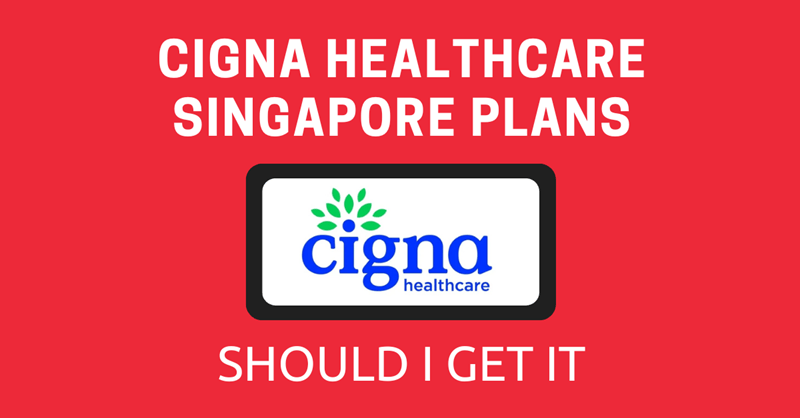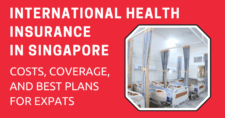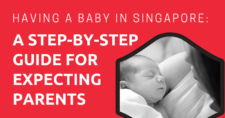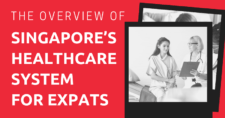
This article will take approximately 24 minutes to read. Don't have the time right now? No worries. Email the ad-free version of the article to yourself and read it later!
Considering Cigna Healthcare in Singapore? Explore detailed reviews of their plans, coverage, costs, and add-ons to see if it’s the right health insurance for expats.
When moving to Singapore, health insurance is one of the first things people think about. Everyone knows Singapore is an expensive place to live, and that includes the cost of healthcare.
If you work here, your employer will usually provide some level of health insurance. However, company coverage often isn’t enough to fully protect you, especially for major hospital bills. That’s why many expats start looking for additional options and quickly come across recommendations for international health insurance.
One name that comes up often is Cigna Healthcare, a provider known worldwide for its comprehensive coverage and strong reputation.
But when it comes to health insurance, you want to make sure you’re choosing the right plan. There’s nothing worse than paying for coverage, only to find out later that you can’t claim it because of hidden terms or exclusions.
In this article, I’ll take a detailed look at Cigna Healthcare’s plans for expats in Singapore. By the end, you’ll have a clear understanding of what Cigna offers, how it works, and whether it’s the right fit for your needs.
The information here is based on my extensive research, including a review of over 100 insurance plans, as well as first-hand experiences shared by expats in Singapore. This way, you’ll get both the technical details and real-world insights to help you make an informed decision.
Disclaimer: This article may include links to products or services offered by ExpatDen's partners, which give us commissions when you click on them. Although this may influence how they appear in the text, we only recommend solutions that we would use in your situation. Read more in our Advertising Disclosure.
Contents
- Key Takeaways
- Why Expats Choose International Insurance Like Cigna
- Why Choose Cigna Healthcare in Singapore
- Cigna Healthcare Plan Options for Expats in Singapore
- Area of Coverage
- Optional Add-Ons
- Additional Benefits
- Exclusions
- Pre-Existing Conditions
- Which Hospitals Can You Visit with Cigna Healthcare?
- Claims Process
- Cost of Cigna Healthcare in Singapore
Key Takeaways
- Singapore has some of the highest healthcare costs in Asia, making private health insurance essential for expats.
- Cigna Healthcare offers comprehensive international coverage, including direct billing with top hospitals like Mount Elizabeth.
- Plans are portable, so you can keep your coverage when moving to another country without reapplying or losing benefits.
- The Silver plan is sufficient for most expats, while the Gold plan adds maternity care and higher limits, and the Platinum plan provides unlimited coverage.
- Adding Outpatient Care is highly recommended due to Singapore’s high consultation and diagnostic costs.
- Cigna Healthcare accepts applicants with pre-existing conditions, though related treatments are usually excluded.
- Price is around SGD 610 (US$447.97) per month, with a US$1,000,000 annual limit, worldwide coverage excluding the US, for a 40-year-old person without any deductible.
- The most accurate way to find your cost is to get a free quote directly from Cigna Healthcare and discuss your needs with their team before making a decision.
Why Expats Choose International Insurance Like Cigna
After speaking with other expats and reviewing countless insurance policies, I’ve found there are four main reasons why expats in Singapore lean toward international plans like Cigna Healthcare.

Portability When You Leave Singapore
Singapore is a small country, and for many expats, it’s not a permanent home. They come here to work for a few years. If you buy a local insurance plan, it only covers you within Singapore. The moment you move to another country, the plan ends, and you’ll have to apply for new coverage from scratch.
This creates a big risk. If you develop any medical conditions while in Singapore, those will now be considered pre-existing conditions, and a new insurer could exclude them or charge you much higher premiums.
With a global plan like Cigna Healthcare, you don’t have to worry about this. You can take your plan with you when you move, no matter where you go. (Please note that whether you are covered beyond Singapore will depend on the type of cover you have chosen. Some packages may cover for short-term visits or wider travel, but check the details of your Cigna insurance for further information.)
Cigna operates in over 200 countries worldwide, so if you move from Singapore to, say, Thailand, the UK, or the US, you can keep the same plan without losing coverage for existing conditions.
Personally, this is one of the main reasons I recommend international insurance. It gives you peace of mind knowing you won’t have to start over every time you relocate.
Avoiding Upfront Payments for Big Hospital Bills
With local insurance, especially for foreigners, you often have to pay the hospital bill upfront and then file a claim to get reimbursed later. This is fine for minor outpatient visits like a routine check-up, which might cost a few hundred dollars.
But when it comes to hospitalization, paying upfront can be a huge cash flow problem. Private hospitals in Singapore are world-class, but they’re also among the most expensive in Asia. A single night in a private room can cost SGD 3,000 to 4,000, and that’s before adding surgery, specialist fees, or ICU care.
For example:
- A three-night stay for a major procedure could easily reach SGD 30,000 to 50,000.
- For something serious like cancer treatment, you could be looking at SGD 300,000 or more over the course of treatment.
With Cigna Healthcare, most major hospitals work on a direct billing system, meaning the insurer pays the hospital directly. You won’t need to front tens of thousands of dollars while you wait for reimbursement.
Worldwide Coverage
International insurance covers you not just in Singapore, but also when you travel. Cigna Healthcare’s network includes over 200 countries, and you can even choose to include coverage in the US, which is known for extremely high medical costs.
This is especially important if you travel frequently for work or leisure. If you have a local plan and get sick while visiting another country, you’ll usually have to buy travel insurance separately or pay out of pocket.
Of course, the area of coverage depends on your plans and options. Check with Cigna Healthcare again before purchasing the plan.
Pre-existing Conditions
Another major drawback of local insurance is how they handle pre-existing conditions. In many cases, if you have any significant health issues, local insurers will simply reject your application entirely.
Expat insurance like Cigna Healthcare usually works differently. Pre-existing conditions are still a major exclusion and will not be covered, but they typically accept you into the plan. This means they will cover any unrelated future health issues while excluding only the conditions you already had when you signed up.
Also, if you are on the Silver, Gold, or Platinum plan, there are certain pre-existing conditions that Cigna Healthcare helps you manage when you are 60 years old or older, including:
- Hypertension
- Type 2 diabetes
- Glaucoma
- Arthritis
- Joint or back pain
- Osteoporosis/osteopenia
This is a great perk that’s rarely found with other providers.
Find out more: The Overview of Singapore’s Healthcare System for Expats
Protection Against Pushy Local Agents
Many local insurance plans in Singapore are sold through agents. Some agents are excellent and genuinely help you find the right coverage, but unfortunately, others focus on upselling. I’ve heard plenty of stories from expats who were pushed into buying more expensive plans or unnecessary riders they didn’t fully understand.
When you work with an international provider like Cigna Healthcare, you can apply directly online or through an expat-focused broker who understands global insurance needs. This takes away a lot of the pressure and confusion that sometimes comes with local agents.
Why Choose Cigna Healthcare in Singapore
Now that you understand why expats in Singapore need expat health insurance, let’s look at the pros and cons of choosing Cigna Healthcare.
Pros of Cigna Healthcare
- It covers Singapore: Since Singapore is an expensive country for healthcare, many affordable international insurance plans, like ACS, clearly state that they don’t cover Singapore. Cigna Healthcare is different. Their plans work well here and give you full access to Singapore’s private healthcare system.
- Sufficient coverage: Even Cigna’s entry-level Silver plan comes with SGD 1,350,000 in annual coverage. This amount is more than enough to handle high-cost treatments in Singapore, such as cancer care, heart surgery, or weeks of hospitalization.
- Reliable support: Cigna Healthcare offers 24/7 multilingual customer support, including English, German, French, Spanish, and more. You can reach them by phone, through their mobile app, or by email.
- Case management: This is one of my personal favorite features and something you don’t see often with other insurers. If you face a serious illness like cancer, Cigna assigns you a dedicated case manager to guide you through every step—helping you find the right doctors, hospitals, and treatment plans. It makes a stressful process much smoother.
- Telemedicine: For minor health issues, you don’t need to waste time visiting a clinic or hospital. Cigna’s telemedicine feature lets you consult directly with doctors in their network from the comfort of your home.
Real-life tip: Many expats pair a local shield plan for essential Singapore coverage with Cigna Healthcare for worldwide protection. This approach helps keep costs manageable while providing flexibility and peace of mind.
Downsides of Cigna Healthcare
Cigna Healthcare isn’t perfect. Here are a few potential downsides to consider:
- Higher cost than local insurance: Cigna’s plans are more expensive compared to local options, though they come with broader international coverage.
- Maternity care limitations: Maternity benefits are only available with the Gold plan and above. If you plan to have a baby, make sure you select the right level of coverage.
- Evacuation and repatriation as add-ons: These aren’t included in the core plan and must be purchased separately. For most expats living in Singapore, this isn’t a major issue since the country is small and well-connected, unless you travel frequently to remote areas.
Cigna Healthcare Plan Options for Expats in Singapore
Cigna offers three main plan tiers for expats in Singapore. Here’s a quick summary, including estimated monthly premiums:
| Plan | Annual Limit | Coverage Area | Estimated Monthly Price |
| Silver | US$1,000,000 (SGD 1,350,000) | Worldwide (option to include/exclude USA) | US$802.65 (SGD 1,090) |
| Gold | US$2,000,000 (SGD 2,700,000) | Worldwide (option to include/exclude USA) | US$607.05 (SGD 825) |
| Platinum | Unlimited | Worldwide (option to include/exclude USA) | US$447.97 (SGD 610) |
Important Remark: Prices are based on a 40-year-old expat living in Singapore, with no U.S. coverage and no deductible. These are estimates only. Your final price may vary depending on your age, nationality, health status, coverage selections, and other factors. If you want to know your price, please get a free quote directly from Cigna Healthcare.
Silver Plan
The Silver plan is the most popular choice among expats living in Singapore. The US$1,000,000 (SGD 1,350,000) annual limit is usually more than enough, even for high-cost treatments in Singapore, such as cancer care, heart surgery, or ICU stays.
For reference, even a complicated case requiring weeks in the ICU at one of Singapore’s top hospitals like Mount Elizabeth Hospital would rarely exceed SGD 300,000 (US$220,000).
Key features include:
- US$1,000,000 annual limit
- Private room for comfortable inpatient stays
- Full cancer care up to the annual limit
- Medical imaging and scans up to US$10,000
- Rehabilitation services, including physiotherapy, up to US$5,000
- Emergency room treatment up to US$500
- Transplant services included
- International coverage for emergencies when traveling outside Singapore
For most expats, this plan provides the perfect balance of affordability and protection. It also ensures you can access Singapore’s best private hospitals without worrying about running out of coverage.
Unless you have very specific needs like maternity coverage or mental health services, the Silver plan is more than sufficient.
Gold Plan
The Gold plan is a step up from Silver, doubling the annual limit to US$2,000,000 (SGD 2,700,000). This plan is particularly attractive for families or individuals planning to have children while living in Singapore, as it includes inpatient maternity and newborn care.
What you get with Gold:
- US$2,000,000 annual limit
- All Silver plan benefits, plus higher limits for various treatments
- Inpatient maternity and newborn care, covering delivery and complications
This plan is a good fit if:
- You’re planning to have a baby in Singapore
- You want extra peace of mind with higher limits for months of intensive treatments
- You travel regularly to other countries and need broader, high-limit coverage
For expats without maternity needs, Gold can sometimes feel like overkill, as few treatments in Singapore exceed the Silver plan’s US$1,000,000 limit.
Platinum Plan
The Platinum plan is Cigna Healthcare’s top-tier option, providing unlimited annual coverage. It’s designed for high-net-worth individuals, frequent international travelers, or those who want to eliminate all worries about cost limits.
Additional benefits of Platinum include:
- Unlimited annual coverage for complete peace of mind
- All Gold plan benefits, plus expanded mental and behavioral health care
- Best for expats who frequently seek medical care overseas or prefer maximum flexibility
While it offers the most comprehensive protection, the Platinum plan is typically unnecessary for most expats in Singapore. The unlimited coverage is mainly useful for individuals who require extensive ongoing care or want the highest level of assurance without ever having to think about costs.
Area of Coverage
When selecting a Cigna Healthcare plan, you’ll need to decide between two coverage area options:
- Worldwide excluding USA
- Worldwide including USA
For almost all expats, it’s best to exclude the USA. Including the U.S. in your plan can significantly increase your premium.
Even if you are from the U.S., you don’t necessarily need to include the USA because Cigna Healthcare plans already come with built-in emergency coverage.
For example, the Silver plan includes US$100,000 (SGD 135,000) in emergency treatment coverage for the U.S. This means that if you happen to face a serious emergency while visiting the U.S., it’s still possible to get urgent care
Therefore, unless you expect to live in the U.S. for long periods or regularly receive non-emergency treatment there, it’s far more cost-effective to exclude the U.S. from your plan.
Optional Add-Ons
Cigna Healthcare’s core plans focus mainly on hospitalization and inpatient treatment, but you can customize your policy with optional add-ons including:
- Outpatient Care
- Medical Evacuation and Repatriation
- Health and Well Being
- Vision and Dental
Your spending limits for each add-on depend on your main plan level. Below are the key numbers for the Silver plan, which most expats in Singapore choose.
Outpatient Care
This add-on covers medical services that don’t require hospital admission, such as specialist visits.
Silver Plan Outpatient Coverage:
| Service | Limit (US$) | Limit (SGD) |
| Annual maximum | 15,000 | 20,250 |
| Consultations & outpatient procedures | 2,500 | 3,375 |
| Prescribed drugs & dressings | 1,500 | 2,025 |
| Diagnostic tests (X-ray, lab work, etc.) | 2,500 | 3,375 |
| Outpatient rehabilitation (physiotherapy, etc.) | 5,000 | 6,750 |
Should I get it?
I recommend you to get this add-on since outpatient care in Singapore is still expensive. For example, based on the Singapore Medical Association Guidelines, a private specialist visit can range from SGD 200–500. This is not something you may want to pay out of pocket.
Medical Evacuation and Repatriation
This add-on covers emergency transportation to another hospital or country if you need specialized care not available locally. It also includes repatriation to your home country and support for accompanying family members.
Key features include:
- Medical evacuation and repatriation paid in full
- Compassionate visit allowance: US$1,200 (SGD 1,620) per trip, up to 5 trips
- Living allowance: US$155 (SGD 210) per day, up to 10 days per trip
Should I get it?
This is particularly useful only if you travel frequently to places that lack medical facilities. If you mostly stay in Singapore, this isn’t necessary, as Singapore is small and has many world-class hospitals.
Health and Wellbeing
This add-on focuses on preventive care and mental health support, helping you stay proactive about your overall health.
Silver Plan Coverage:
| Service | Limit (US$) | Limit (SGD) |
| Routine physical exam | 325 | 440 |
| Footcare (up to 5 sessions) | 325 | 440 |
| Cancer screenings (cervical, prostate, breast) | 325 each | 440 each |
| Mental health support | 20 face-to-face sessions per year | 20 face-to-face sessions per year |
Should you get it?
In my opinion, this add-on is completely optional. It’s most useful if you plan to get mental health support, since therapy sessions in Singapore can cost SGD 150–300 per session. Over the course of a year, just a few visits could easily justify the cost of this upgrade.
For routine health check-ups, the SGD 440 limit per visit is reasonable for most situations. A basic health screening package in Singapore usually costs SGD 300–500, while more comprehensive screenings with advanced tests can go up to SGD 800–1,200. This means the coverage is generally enough for standard check-ups, but you may need to pay extra if you opt for premium executive health screenings.
Another benefit of having this add-on is motivation. Since you’ve already paid for preventive services, you’ll be more likely to schedule annual check-ups and stay on top of your health.
Vision and Dental
This module covers basic vision and dental care. Silver Plan Coverage:
| Service | Limit (US$) | Limit (SGD) |
| Eye exam (1 per year) | 100 | 135 |
| Glasses or contact lenses | 155 | 210 |
| Dental care annual max | 1,250 | 1,690 |
| Routine dental | 80% reimbursement | 80% reimbursement |
| Major restorative dental | 70% reimbursement | 70% reimbursement |
| Orthodontics (under 18) | 40% reimbursement | 40% reimbursement |
Should I get it?
While useful, many expats choose to pay out of pocket instead, as Singapore’s routine dental and eye care costs are manageable.
Which Add-Ons Should You Get?
In my opinion, the Outpatient Care add-on is the one you should definitely include when living in Singapore. Outpatient costs here are very high, and even a few visits to specialists or diagnostic tests can quickly add up to thousands of dollars.
Evacuation and Repatriation and Health and Wellbeing are more situational.
- Consider Evacuation and Repatriation if you travel frequently around Asia or visit remote areas where advanced medical facilities aren’t available.
- The Health and Wellbeing add-on is worth it if you plan to use mental health services regularly or if you want to encourage yourself to get annual check-ups since some costs are already covered.
As for Vision and Dental, I don’t think it’s necessary for most expats. Routine eye exams and basic dental care in Singapore are affordable enough to pay out of pocket, making this add-on less cost-effective.
Additional Benefits
Cigna Healthcare offers a range of extra services that make their plans stand out from many other insurers. These benefits go beyond basic medical coverage and are designed to make your healthcare experience smoother and more convenient.
Telemedicine
You can schedule online consultations with licensed doctors through Cigna Healthcare’s telemedicine service. This allows you to receive real-time medical advice and diagnosis, anytime and anywhere. In many cases, doctors can even help you get prescribed medication directly through this service.
Case Management
This is one of my personal favorite features. If you face a serious health issue, Cigna will assign you a dedicated case manager who becomes your single point of contact. They’ll guide you through every step, including:
- Which hospital to go to
- Which specialist to see
- Coordinating treatment plans and paperwork. This support saves you countless hours of research and makes the entire treatment process far less stressful.
Cigna Mobile App
With the Cigna app, you can easily manage your policy, track claims, view payments, and submit receipts, all from your phone. This level of convenience is something only large, established insurers typically provide.
24/7 Multilingual Support
Cigna’s customer service team is available around the clock. If English isn’t your first language, support is also available in major languages like Spanish, French, German, Dutch, and Chinese. This makes it much easier to resolve issues and ask questions without language barriers.
Exclusions
Like any other health insurance plan, Cigna Healthcare does not cover everything. There are certain medical services and situations that are excluded from coverage. Some of the most common exclusions include:
- Self-inflicted injuries
- Prescriptions related to pre-existing or non-disclosed conditions
- Nutritional counseling and food supplements
- Life support, unless recovery is expected
- Sleep disorders (except for severe sleep apnea)
- Injuries caused by wars, conflicts, or natural disasters
- Obesity-related treatments (only covered under Gold and Platinum plans)
- Treatments for addiction or alcohol use disorder
These exclusions are fairly standard across private insurance plans, so they shouldn’t come as a surprise. If you want to review the complete list of exclusions, you can read the full policy document directly on Cigna Healthcare’s website: View Cigna Healthcare Policy Exclusions (PDF)
Pre-Existing Conditions
In Singapore, it’s important to understand that local health insurance almost always excludes pre-existing conditions. In many cases, local insurers may even reject your application entirely if you have a serious condition.
Cigna Healthcare takes a different approach. You can still get approved for a plan, but there’s a high chance that your pre-existing condition will be excluded from coverage. This means the insurer won’t pay for any treatment related to that specific condition, but you’ll still be covered for other unrelated medical needs.
That said, Cigna Healthcare does offer support for managing certain long-term conditions. While they may not cover treatment for the underlying illness, they can help you maintain some health conditions below:
- Hypertension (high blood pressure)
- Type 2 diabetes
- Glaucoma
- Arthritis
- Joint or back pain
- Osteoporosis or osteopenia
Important advice:
If you have any pre-existing conditions, always discuss them in detail with the insurer before signing up. Trying to hide your medical history is risky. I’ve heard many stories of expats who withheld information only to have their claims rejected later when the insurer discovered the undisclosed condition.
Which Hospitals Can You Visit with Cigna Healthcare?
With Cigna Healthcare, you should be able to visit almost any hospital in Singapore, including both public and private facilities. However, I recommend choosing top-tier private hospitals, as they offer faster service, better amenities, and English-speaking staff.
One of the most reputable private hospitals in Singapore is Mount Elizabeth Hospital. Their website clearly states that they work directly with Cigna Healthcare, meaning your treatment should be billed directly to the insurer, so you won’t need to pay large amounts upfront.
Since hospital networks can change over time, it’s always a good idea to confirm with Cigna Healthcare first to get the most updated list of partnered hospitals.
Tip: Before undergoing major treatments, especially for serious illnesses, always contact Cigna Healthcare to get pre-authorization. This step is crucial because:
- It ensures that your treatment is fully covered under your plan.
- Cigna Healthcare can recommend experienced doctors and specialists for your specific condition.
- It saves you from unpleasant surprises with billing or coverage disputes later.
Claims Process
Cigna Healthcare makes the claims process straightforward for expats in Singapore.
- Inpatient care: Most private hospitals in Singapore offer direct billing for inpatient treatments. This means you don’t have to pay upfront for your hospital stay. Just don’t forget to contact Cigna Healthcare first to get pre-authorization.
- Outpatient care: For outpatient visits, you’ll need to pay first, then submit your receipts through the Cigna mobile app for reimbursement. Claims are typically processed within five working days after Cigna Healthcare receives all documents.
Cost of Cigna Healthcare in Singapore
As mentioned earlier, Cigna Healthcare isn’t the cheapest option on the market. In fact, their plans can sometimes be slightly more expensive than other providers, but you’re paying for comprehensive global coverage and premium services like 24/7 multilingual support and direct billing at top hospitals.
Below is an estimated monthly cost for a 40-year-old expat living in Singapore, with worldwide coverage excluding the U.S. and no deductible:
| Plan | Annual Limit | Estimated Monthly Cost |
| Silver | US$1,000,000 (SGD 1,350,000) | US$447.97 (SGD 610) |
| Gold | US$2,000,000 (SGD 2,700,000) | US$607.05 (SGD 825) |
| Platinum | Unlimited | US$802.65 (SGD 1,090) |
How to Reduce Your Premium
If you want to lower your monthly costs, there are three main ways to do it:
- Choose a deductible – Deductibles range from US$375 to US$10,000. The higher your deductible, the lower your premium.
- Select cost-sharing options – You can choose to pay 10% to 30% of treatment costs after your deductible, which will reduce your monthly premium even further.
- Combine both options – For the biggest savings, you can select both a deductible and a cost-sharing plan at the same time.
Note: These costs are estimates only. Just like other insurers, Cigna Healthcare calculates your premium based on several factors such as age, nationality, health status, and chosen coverage options.
The most accurate way to find out your actual cost is to request a free quote directly from Cigna Healthcare.
Is Cigna Healthcare Right for You?
To help you decide whether Cigna Healthcare is the right fit, here are some quick guidelines.
Cigna Healthcare is a good choice if you:
- Want international health insurance with worldwide coverage
- Have some budget flexibility for a higher-end health insurance plan
- Prefer a reliable insurer that works with leading hospitals in Singapore and worldwide
- Value strong customer support to help you navigate hospital visits and claims smoothly
Cigna Healthcare may not be ideal if you:
- Have a limited budget and are looking for the most affordable plan available
If you’re interested in exploring Cigna Healthcare further, the best next step is to request a personalized quote. A Cigna representative will get back to you shortly, and you’ll have the opportunity to ask questions directly to determine whether the plan suits your needs.
Disclaimer
This article is based on my in-depth research and information provided by the Cigna Healthcare team. However, mistakes can happen, and health insurance policies are complex and subject to change. Please use this article for reference only. To confirm details such as pricing, coverage, or eligibility, always speak directly with the Cigna Healthcare team.





